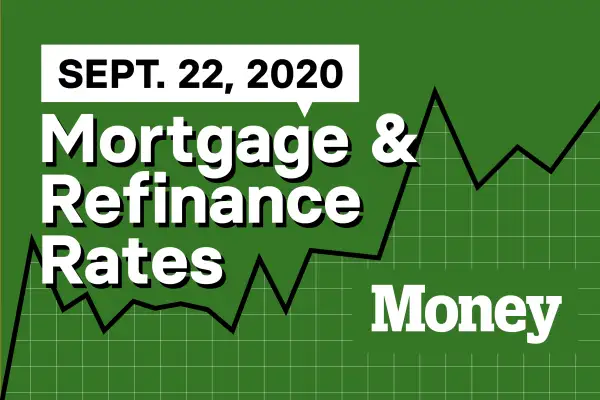Here Are Today's Best Mortgage & Refinance Rates for September 22, 2020

Borrowers with 700 credit scores were quoted an average rate of 3.628% to secure a 30-year fixed-rate purchase mortgage on Monday, according to Money's survey of over 8,000 lenders across the United States. At this credit score, roughly the national average, the rate for a 30-year refinance was 4.488%. Our rates include discount points and are for borrowers putting 20% down.
| 30-year fixed-rate purchase mortgage |
| 3.628% |
| Rate of September 21, 2020 |
Borrowers in Michigan were quoted the lowest mortgage rates on Monday—at 3.421%. Those in Rhode Island saw the highest average rate at 3.836%. Nationwide, borrowers with the highest credit scores, 740 and above, were quoted rates averaging 3.142%, while those with credit of 640 or below were given rates of 4.791%—a 1.649 percentage point spread.
You may be able to negotiate a lower rate if you shop around or if you have other accounts with the lender. (Money's picks for the best mortgage lenders are here.) Currently, some banks are hiking up advertised rates to keep demand in check, so you may be offered a lower rate if you reach out directly.
Freddie Mac's widely quoted Primary Mortgage Market Survey put rates at 2.87% with 0.8 points paid for the week ending September 17. The mortgage purchaser's weekly survey reflects borrowers who put 20% down on conforming loans and have excellent credit.
Refinance rates today
Money's survey also shows that the offered rate for a 30 year refinance for someone with a 740 credit score was 3.791% on Monday. Last September, the average mortgage rate (including fees) was 3.922%.
| 30-year fixed-rate mortgage refi |
| 3.791% |
| Rate of September 21, 2020 |
A homeowner with a $200,000 mortgage balance currently paying 3.922% on a 30-year loan could potentially cut their monthly payment from $946 to $931 by financing at today's lower rates. To determine if it's worth it to refinance your mortgage, also consider the closing fees you paid on your current mortgage, how much your new lender is charging and how long you have left on your loan term. (Our picks for the best lenders for refinancing are here).
What else is happening in the housing market right now?
The overall share of mortgage loans in forbearance reached its lowest point in five months, decreasing from 7.01% to 6.93% for the week ending September 13, according to the Mortgage Bankers Association. The share of Fannie Mae and Freddie Mac loans in the payment deferral programs decreased for the 15th week in a row, down 10 basis point to 4.55%.
The share of loans in forbearance for private-label securities, portfolio loans, independent mortgage banks, and depository servicers all decreased during the week. The only category that increased was Ginnie Mae loans, which went up 3 basis points to 9.15%. It also marks the second week in a row where the number of forbearance requests for these loans has increased.
"While housing market data continue to show a quite strong recovery, the job market recovery appears to have slowed, and we are seeing the impact of this slowdown on FHA and VA borrowers in the Ginnie Mae portfolio," said Mike Fratantoni, chief economist for the MBA.
Mortgage Prediction of the Week
Cecelia Marlow, vice president of the Federal Savings Bank of Chicago, on how low mortgage rates will go:
Given the various economic indicators, rates will remain historically low. With uncertainty around unemployment and the timing of a viable COVID-19 vaccine, plus the continued demand in the housing market, we will continue to notice rates remaining steady in the current range. As we approach the election later in the year, we may see higher intra-day volatility."
For more read: How Low Will They Go: 6 Mortgage Experts Predict the Future of Rates.
Bottom line:
Mortgage Rates Vary From State to State. Here's How to Get the Best Deal if You're Moving
The Ultimate Guide to Ditching the City and Moving to the Suburbs
Procrastinators, It's Not Too Late to Refinance Your Mortgage and Save Thousands
